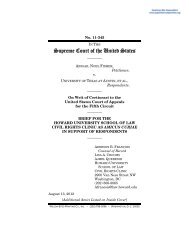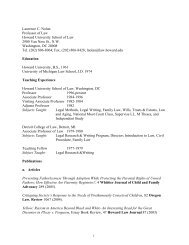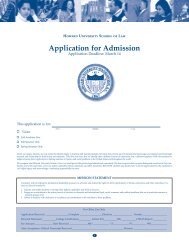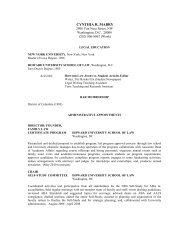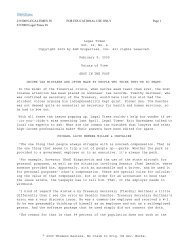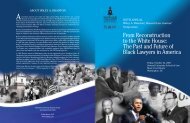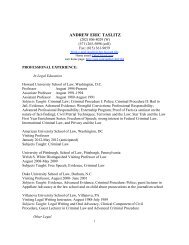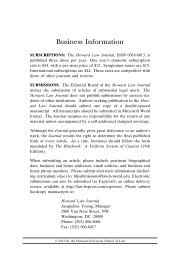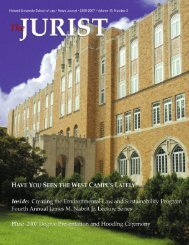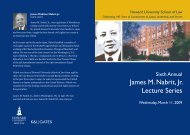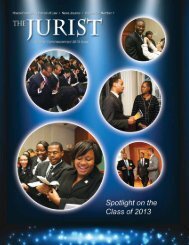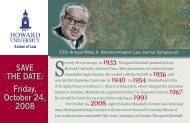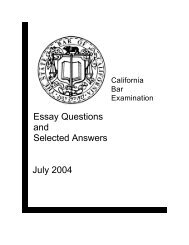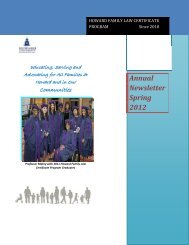Student Affairs Guide - Howard University School of Law
Student Affairs Guide - Howard University School of Law
Student Affairs Guide - Howard University School of Law
You also want an ePaper? Increase the reach of your titles
YUMPU automatically turns print PDFs into web optimized ePapers that Google loves.
examples <strong>of</strong> using ideas and expressions from others. The source <strong>of</strong> the quotationsor paraphrase or idea must be properly credited.One common problem area arises from paraphrasing. Lengthy paraphrasingshould be avoided. Reordering paraphrased paragraphs does not shield one fromthe necessity <strong>of</strong> giving proper credit to the source <strong>of</strong> the ideas. A single generalcitation at the end or beginning <strong>of</strong> a lengthy paraphrase does not adequately creditthe source, although such a citation for a single sentence or proposition <strong>of</strong>ten willbe adequate. If a lengthy passage <strong>of</strong> a student’s writing was largely inspired byand/or dependent on and/or consists <strong>of</strong> essentially a paraphrase <strong>of</strong> another’s work,the student’s citation should so disclose.Another common problem arises from the use <strong>of</strong> certain ideas and terms whichare so common in legal discourse (or general discourse) that no citation is needed.For example, one need not use a citation for the proposition that the freedom <strong>of</strong>speech is one <strong>of</strong> our most cherished and important liberties. Nonetheless, acitation to a Supreme Court case or to Jefferson or to some other authority whichdiscusses the point at greater length would be appropriate. When there is theslightest doubt about the need for citation, the citation should be included.3-1004 Seriousness <strong>of</strong> Academic PurposeTo achieve its educational purposes <strong>Howard</strong> <strong>University</strong> <strong>School</strong> <strong>of</strong> <strong>Law</strong> mustmaintain an environment conducive to learning and to scholarly endeavors byboth faculty and students. Seriousness <strong>of</strong> academic purpose requires students toprepare daily, to complete assignments in a timely fashion, to attend class, to bepunctual, and to participate in class. Unexcused failure to meet one or more <strong>of</strong>these basic requirements may indicate a lack <strong>of</strong> seriousness <strong>of</strong> purpose and maysubject a student to discipline. Seriousness <strong>of</strong> academic purpose also encompassesappropriate conduct throughout the <strong>School</strong> <strong>of</strong> <strong>Law</strong>, the <strong>University</strong>, and theWashington, D.C., community.3-1005 EmploymentThe study <strong>of</strong> law, especially in the first year, is a full-time endeavor. Experiencehas proven that it is in the best academic interest <strong>of</strong> the student not to undertake apart- time job, especially during the first year <strong>of</strong> study. Nonetheless, the lawschool faculty and administration recognize that some students must obtain parttimejobs to help defray expenses. Consequently and in accordance with ABAstandards, the faculty has adopted a policy permitting part-time employment notto exceed 20 hours. The faculty reserves the right to require any student engagingin outside employment to either reduce or terminate the employment if, in thejudgment <strong>of</strong> the faculty, acting through the <strong>Student</strong> <strong>Affairs</strong> Committee, suchreduction or termination is warranted in light <strong>of</strong> the student’s academicRev. August 2012 57



